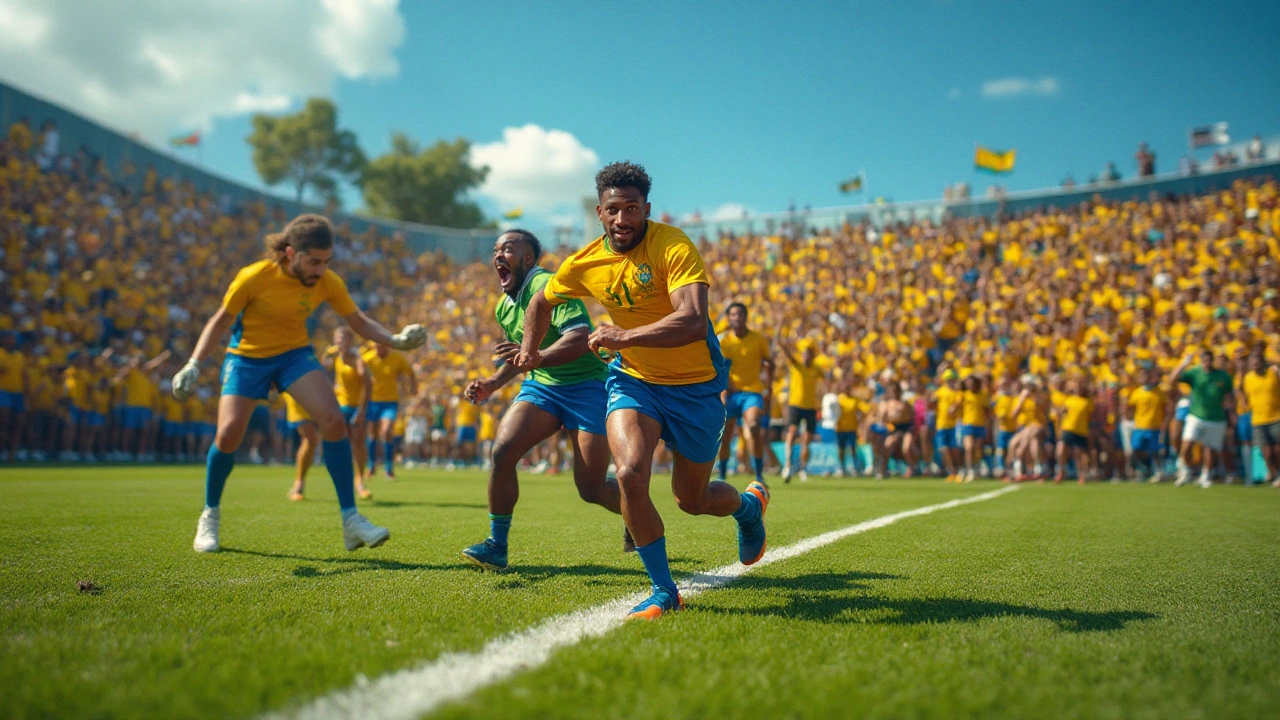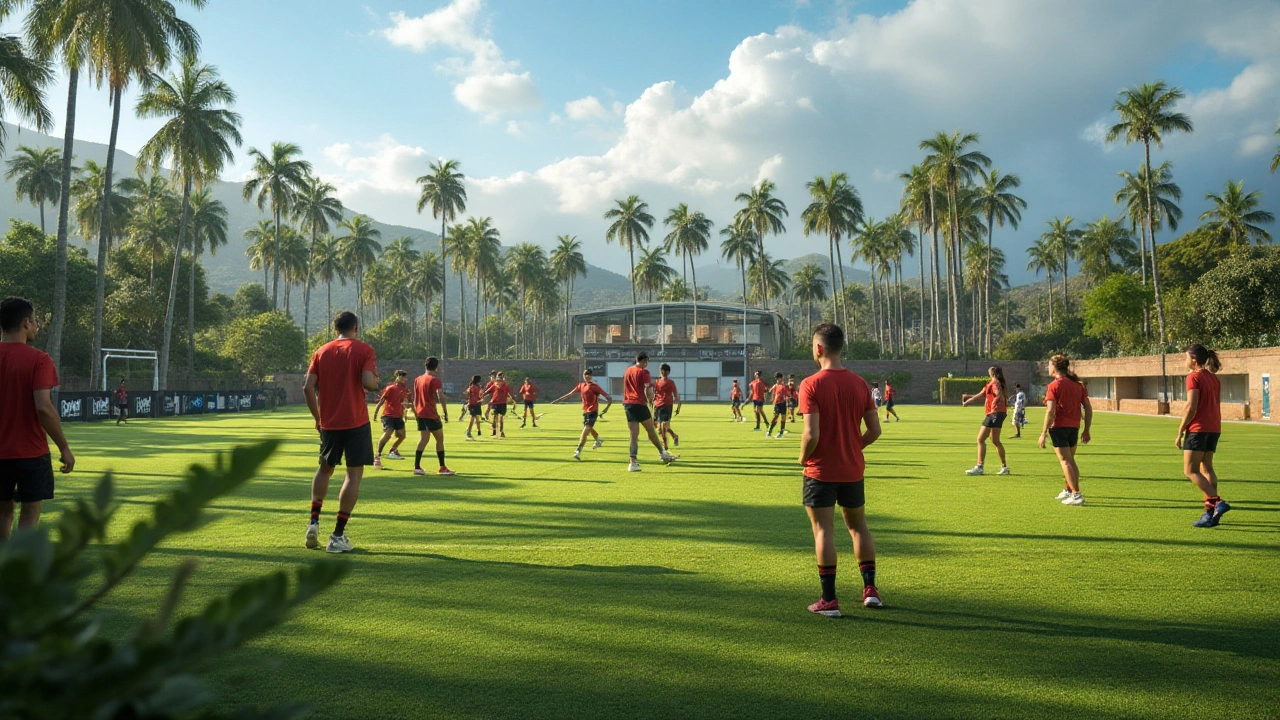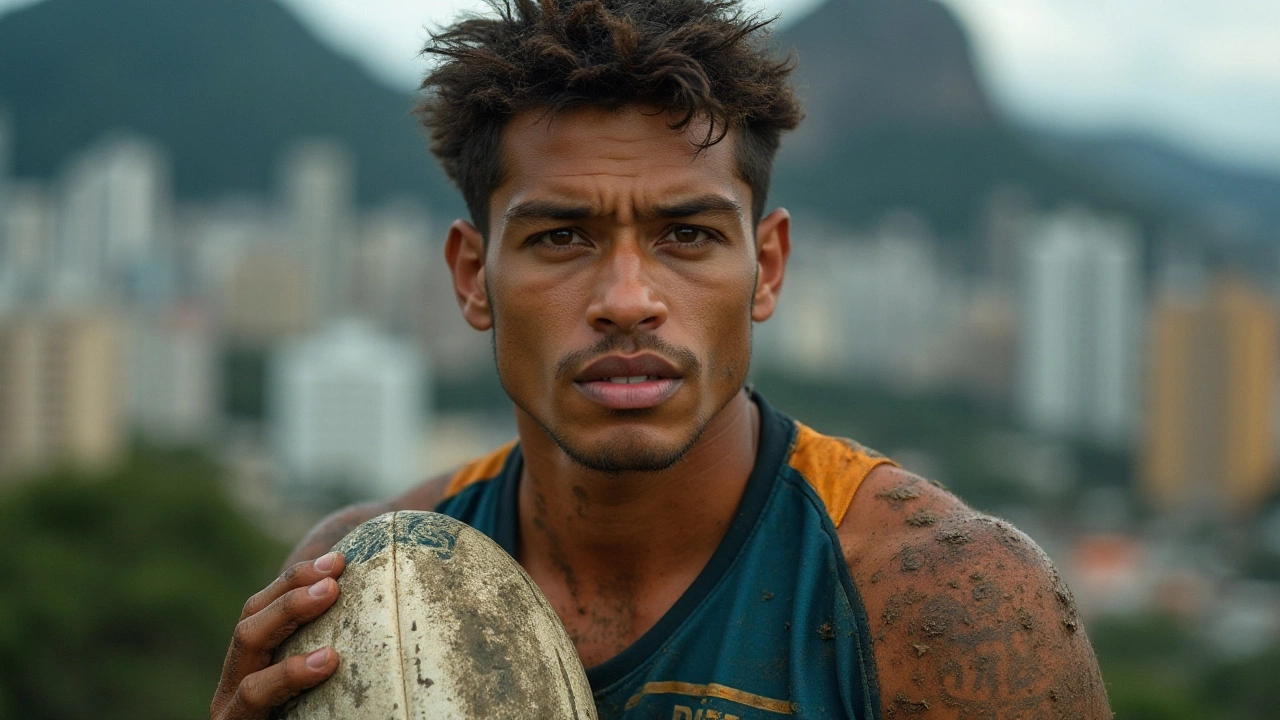Exploring Brazil's Sports Culture: Rugby's Place in the Spotlight
 Jan, 29 2025
Jan, 29 2025
Brazil is synonymous with an intense love for sports, with soccer famously dominating hearts across the nation. Yet, in recent years, another sport has been quietly gathering momentum. Rugby, once merely a whisper, is steadily making its presence known in the vast panorama of Brazilian sports culture.
Nurtured by dedicated enthusiasts and fueled by a spirit of resilience, rugby is finding its footing in regions where soccer's shadow looms large. While it may not be the number one sport yet, the increased interest is undeniable. Clubs and schools alike are fostering young talents, while international competitions have spurred aspirations and inspired new generations.
- The Unrivaled King: Soccer in Brazil
- Rugby's Growing Popularity
- Key Milestones for Brazilian Rugby
- Challenges Facing Rugby's Growth
- Local Talent and Rugby Development
- Future Prospects for Rugby in Brazil
The Unrivaled King: Soccer in Brazil
When you think of sports in Brazil, soccer undeniably takes center stage as the heartbeat of the nation. Strolling through Brazil's vibrant cities, you will inevitably encounter bustling soccer fields playing host to both professionals and amateurs alike. The sport's passion, deeply rooted in the nation's history, transcends age and economic barriers. This ardor can be traced back to the early 20th century when soccer first landed on Brazil's shores, swiftly capturing the imagination of its people. Today, Brazil holds five FIFA World Cup titles, a testament to its prowess and dedication to the beautiful game. These victories are not just celebrated events; they are national holidays, inspiring pride and unity amidst a backdrop of samba and joy.
Brazilian culture is profoundly interwoven with soccer's rich tapestry. The game is not confined to the grand stadiums; it's alive in community fields and spirited neighborhood matches. Soccer legends like Pele and Ronaldo, household names worldwide, remain enduring symbols of Brazil’s sports culture, epitomizing excellence and charisma both on and off the field. This connection extends beyond mere entertainment, highlighting soccer's role as a social equalizer, often elevating promising talent from favelas to international stardom. The passion for soccer is palpable, echoing through generations as families gather to watch matches, creating cherished memories with each goal and penalty.
Brazil's dominance in soccer is fortified by a remarkable youth development system. Talented teens are identified and nurtured through a rigorous training regimen, often joining established clubs known for their commitment to honing young aspirants into professional athletes. This methodical approach forms the backbone of Brazil's success, shaping future stars like Neymar, who emerge from these academies to dazzle audiences around the globe. Such commitment to fostering talent is evident during international tournaments where Brazil's players exhibit unmatched skill, agility, and creativity, often redefining the boundaries of the sport itself.
While soccer maintains its unrivaled status, it hasn't monopolized all eyes. Emerging sports like rugby are beginning to weave their own narratives within Brazil's sports culture, challenging perceptions and drawing spectators. Yet nothing quite captures the national consciousness like soccer. Institutions and policies continually reinforce its supremacy, investing in infrastructure and initiatives to support the sport's growth and grassroots development. Brazil's stadiums, such as the Maracanã, are not merely venues but hallowed grounds that have witnessed historical matches and euphoric triumphs. They stand as symbols of Brazil’s unwavering devotion to soccer, echoing tales of glory and heartbreak.
Soccer in Brazil is an experience as much as it is a sport—a spectacle painted with enthusiasm, vigor, and flair. The country's profound connection to the game is ubiquitous, permeating daily life and conversations. As Brazil embraces new sporting endeavors like rugby, soccer remains deeply entrenched, offering an enduring legacy that influences both cultural identity and international perception. This symbiotic relationship between sport and nation continues to thrive, perpetuating a tradition that is inextricably linked to Brazilians' very essence.
"In soccer, we do not just win games; we declare who we are," remarked columnist Paulo Coelho, capturing the heart of a nation marked by its unyielding love for the sport.
Rugby's Growing Popularity
In recent years, Brazil has seen a remarkable surge in the popularity of rugby, a sport not traditionally associated with the region. This growth is particularly evident in urban centers such as São Paulo and Rio de Janeiro, where rugby clubs have expanded their membership significantly. The roots of this burgeoning interest can be traced back to rugby's inclusion in the 2016 Rio Olympics, where exposure to international teams ignited a curiosity and appreciation for the game.
Part of rugby's attraction lies in its community-oriented spirit, which aligns harmoniously with the social fabric of Brazilian life. The sport is viewed by many as an opportunity to foster inclusiveness and camaraderie, transcending typical socio-economic barriers. Local clubs often engage in outreach programs aimed at introducing the sport to children from varied backgrounds, ensuring a diverse and enthusiastic base of new players.
The Brazilian Rugby Confederation (CBRu) has played a critical role in nurturing this growing interest. Its strategic initiatives, including partnerships with schools and increased access to training facilities, have created a robust pipeline for rugby talent. As a result, local competitions have become more competitive, with clubs participating in regional leagues that capture the excitement akin to soccer's age-old rivalries.
The entrance of international coaches and players into Brazilian rugby has also been a catalyst for skills development. These experts bring with them invaluable knowledge and tactical expertise, fostering a transfer of skills that has elevated the quality of play domestically. This international exchange has not only improved Brazil's rugby standing but has also led to thrilling matches that draw significant spectator turnout.
"Rugby in Brazil is more than a sport; it's a movement that encapsulates the spirit of resilience and teamwork," stated Ben Smith, a renowned sports journalist, highlighting the cultural impact of rugby on Brazilian society.
Statistical data from the CBRu offers a glimpse into this upward trajectory. For instance, since 2016, registered rugby players in Brazil have increased by over 50%, reflecting both grassroots involvement and growing fanbases. The expansion is visible during national tournaments where attendance numbers have been steadily rising, creating a lucrative market for sports brands and merchandise.
This heightened interest in rugby is not without its challenges. Logistics and funding remain pressing issues, as the infrastructure required to sustain rugby's growth needs substantial financial backing. Despite these hurdles, the spirit within the rugby community remains optimistic and determined. As the popularity of this dynamic sport continues to grow, stakeholders are confident that it will carve out a permanent place on Brazil's sporting stage, standing tall amidst the nation's established athletic traditions.

Key Milestones for Brazilian Rugby
The story of rugby in Brazil is one of indirect sunlight gradually breaking through the dense canopy of traditional sports. It's a testament to the resolve of a community determined to bring something different to the sporting landscape. The first significant milestone was the establishment of the Brazilian Rugby Confederation in 1963, which laid the foundation for organized play nationwide. At the time, gaining even minimal attention in a soccer-dominated market was an uphill battle. However, the seeds were sown, and rugby enthusiasts found a collective voice to promote the sport.
In 2009, rugby in Brazil experienced a groundbreaking moment when the country was awarded hosting rights for the South American Rugby Championship. Hosting this high-level tournament brought international attention and served as a critical platform to showcase Brazilian rugby talents. Stadiums filled with enthusiastic crowds marked a cultural shift, signaling Brazil's readiness to embrace rugby on a larger scale and compete against other South American nations that had long embraced the sport.
"Playing rugby in Brazil isn't just about the game; it's about changing perceptions and building a new narrative," said a spokesperson from the Brazilian Rugby Confederation in a poignant statement reflecting their mission.
One of the most transformative milestones came in 2016 when Brazil played host to the Summer Olympics in Rio de Janeiro. Rugby sevens made its Olympic debut here, offering a golden opportunity for the sport to capture the imagination of the Brazilian public. While the Brazilian team's campaign was a learning curve, it symbolized their arrival on the global stage. Rugby received unprecedented media coverage during these games, igniting a spark of interest among a whole new audience.
Following the Olympics, there's been a notable increase in youth participation as schools and local clubs spring up across the country. Also, the Brazilian women's rugby team, affectionately called "The Yarras," achieved a momentous victory by securing a spot in the 2020 Tokyo Olympics, solidifying rugby as a sport with genuine promise and potential in Brazil. Their success has inspired a generation of aspiring players, proving that rugby can offer both men and women a new field to excel in.
The milestones achieved by Brazilian rugby have not only elevated its standing domestically but have also firmly positioned Brazil as a contender in the international rugby scene. As more players from Brazil begin to make their mark in elite leagues around the world, the future seems bright. The once sequestered rugby fields are now testaments to the resilience and passion that characterize the sport's evolution in this vibrant nation.
Challenges Facing Rugby's Growth
Rugby in Brazil faces unique challenges as it seeks to embed itself within a country predominantly ruled by soccer. Despite growing interest, rugby's expansion is hindered by several factors that demand comprehensive solutions to ensure the sport's future viability. Among these challenges is the significant lack of infrastructure dedicated to the sport. Many Brazilian cities lack rugby-specific fields, forcing enthusiasts to share spaces with other sports. This sometimes results in logistical complications and scheduling conflicts that limit practice opportunities and competitive play.
In addition to infrastructural limitations, rugby often finds itself fighting for attention within a crowded sports market. Public perception and media coverage heavily favor traditional sports such as soccer and volleyball. As a result, rugby struggles to capture headlines and often remains out of sight for potential players and fans. Perception is a powerful thing, and shifting it requires strategic promotion of the sport, potentially through engaging media narratives and partnerships with popular sports personalities.
An intriguing insight comes from Lucas Ribeiro, president of the Brazil Rugby Federation, who points out, "We need to innovate our approach to building interest. It's not an easy journey, but it's one that comes with immense excitement and potential." His words underscore the importance of creativity and persistence in overcoming entrenched interests.
Funding is another hurdle—allocations from governmental and private sectors often prioritize more mainstream sports. This financial shortfall impacts everything from grassroots development programs to the maintenance of professional rugby clubs. Rugby has had to rely heavily on passionate volunteers, who contribute tirelessly but lack the resources necessary to transform their commitment into widespread impact.
Education about the sport's nuances is also a considerable challenge. Rugby, being relatively new to the Brazilian public, requires considerable efforts in education—both for aspiring players and enthusiastic spectators. Initiatives aimed at integrating rugby into school curriculums could play a pivotal role in demystifying the rules and stimulating interest among younger generations. Such educational efforts are crucial in cultivating a homegrown appreciation and understanding of the sport.
Despite these obstacles, the resilience of Brazilian rugby players and supporters keeps the sport alive, nurturing dreams of brighter days. Efforts to tackle these challenges are ongoing, with initiatives designed to address each issue systematically. Nonetheless, the road ahead demands patience, innovation, and a collective effort from all stakeholders committed to elevating rugby on Brazilian soil.

Local Talent and Rugby Development
The nurturing of Brazilian rugby talent is a testament to the country's growing dedication to diversifying its sports culture. Local clubs and educational initiatives have laid the groundwork for identifying and honing potential rugby stars. Unlike the traditional sports pathways in Brazil, rugby development often happens in grassroots settings where passion is the driving force. The Brazilian Rugby Federation, known for its dynamic approach, has been pivotal in organizing youth tournaments and crafting training programs that align with international standards. This structure not only fosters skill development but also instills a sense of community and sportsmanship among young athletes.
The role of schools cannot be underestimated in this transformative journey. Many educational institutions, recognizing the sport's potential, now include rugby in their physical education curriculum. This move has not only widened the pool of young talents but has also introduced the sport to diverse social strata, breaking through cultural norms that once favored only the more established sports like soccer. Teachers and coaches play a crucial role, often serving as both mentors and scouts. Their enthusiasm and dedication have been integral to maintaining momentum in this rugby renaissance.
A noticeable shift is occurring in Brazil's sports landscape as universities join the rugby development cause, forming competitive teams and engaging in national tournaments. These platforms offer young athletes an opportunity to compete at higher levels and expose them to scouting from international clubs. Through partnerships with established rugby nations, there are exchange programs that allow Brazilian players to train and gain experience abroad. Such initiatives not only enhance player skills but also enrich the strategic depth of Brazilian rugby through cross-cultural exchanges.
"Rugby in Brazil is more than a game; it's becoming a promising avenue for personal growth and international representation," said a spokesperson from the Brazilian Rugby Federation.
Despite these developments, challenges remain. Infrastructure and funding continue to pose limitations. Many clubs rely heavily on community support, fundraising, and occasional sponsorships. Yet, these constraints have not dimmed the spirit of aspiring rugby players. Instead, they illustrate the resourcefulness and determination inherent in Brazilian sports culture. Local talent shines at both national and international events, arguably due in part to the adversity and creativity bred from these very challenges. Parents and supporters serve as the backbone, often volunteering in various capacities to aid in their clubs' growth.
Looking ahead, the outlook is promising. With significant investments being funneled into mentoring programs and partnerships, the next generation of Brazil sports enthusiasts may very well find themselves picking up a rugby ball as naturally as a soccer one. As Brazil's love for rugby spreads, so too does its promise to generate sports icons who will inspire future generations. Such a climate is ripe for not only local development but also for attracting international attention, positioning Brazilian rugby as an exciting field of opportunity both commercially and culturally.
Future Prospects for Rugby in Brazil
As rugby gradually makes its mark in Brazil's sporting landscape, its future prospects look increasingly promising. The growing popularity of rugby is not only testament to the sport's universal appeal but also a reflection of concerted efforts by local associations and international bodies to embed the game firmly within Brazilian culture. A key component in this upward trajectory is the investment in grassroots development, which aims to nurture enthusiasm and skill from a young age, providing a solid foundation for the sport's future growth. Schools and communities are embracing rugby with open arms, recognizing its benefits in promoting team spirit, fitness, and discipline. This widespread adoption is expected to fuel the sport's expansion across the country, reaching even the most remote regions.
Adding to this momentum, Brazil's hosting of international rugby events has propelled the sport into the spotlight, showcasing both the nation's capability to facilitate large-scale sporting events and the potential of rugby to engage diverse audiences. The exposure generated through these events has drawn attention from sponsors and media, which is instrumental in securing the financial backing necessary to sustain growth. As investments pour in, the quality of training programs improves, fostering a new generation of athletes with the ambition to compete on global platforms, ultimately elevating the status of rugby within Brazil's sports hierarchy.
Rafael dos Santos, a prominent figure in Brazilian rugby, once noted, "Our goal is to create an environment where rugby is accessible to everyone, where young talents can see a pathway from local clubs to national jerseys."
Moreover, alliances with well-established rugby nations have led to an exchange of knowledge and expertise, enriching the level of play and strategic insight among Brazilian teams. These partnerships often involve participation in international leagues and friendly matches, which not only improve the competitive caliber of Brazilian rugby but also foster cross-cultural ties through sport. By enhancing the visibility and accessibility of rugby through television broadcasts and digital media platforms, more Brazilians are likely to discover and take an interest in the sport, further strengthening its presence nationwide.
The commitment to developing local talent is paving the way for Brazil to become a formidable contender on the international rugby scene. While challenges remain—such as competing for athletes' interest with the ever-popular soccer—there is a palpable sense of optimism and determination driving the rugby community forward. With ongoing support from sports federations, government initiatives, and grassroots movements, the future of rugby in Brazil holds the promise of unprecedented growth and achievement. Aided by passionate advocates and dedicated players, the sport is poised to find its place amongst Brazil's cherished athletic traditions.